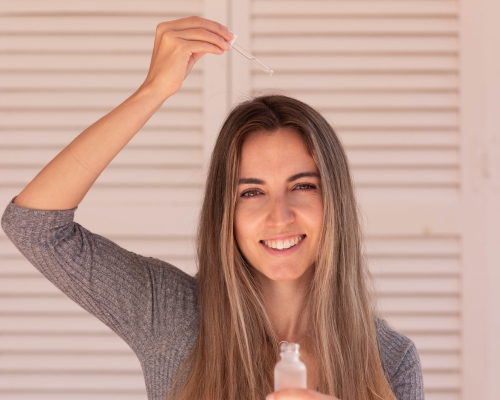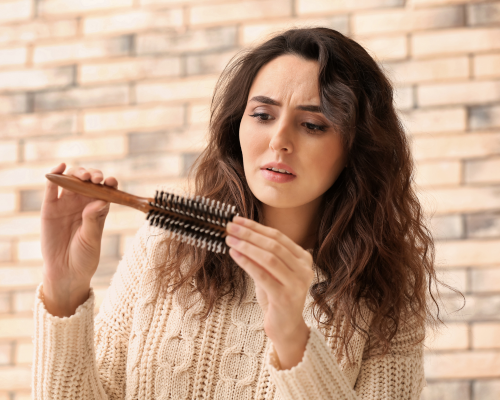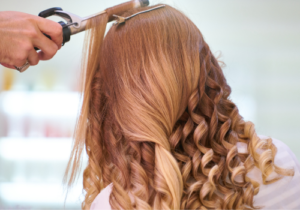Introduction to the role of sebum and hair problems
Definition of sebum
Sebum is an oily substance produced by the sebaceous glands in the skin. These glands are found all over the body, with the exception of the palms and feet. Sebum plays a crucial role in protecting and moisturizing skin and hair, forming a protective barrier against external aggressors such as pollution and bacteria. Understanding how sebum works is essential to identifying the problems associated with its excessive production, including the negative impact this can have on hair health.
Role of sebum for skin and hair
Sebum is essential for maintaining healthy, supple skin. It helps retain moisture in the skin, helping to prevent dryness and maintain an optimal hydrolipidic balance. As for hair, sebum keeps it hydrated and shiny, preventing breakage and dryness. However, excessive sebum production can lead to problems such as oily skin, acne and, in some cases, hair loss.
Understanding hair loss
Hair loss is a common problem affecting many people, regardless of age or gender. Identifying the causes of hair loss is crucial to determining the most suitable and effective treatments.
Common causes of hair loss
- Hormonal factors: Hormonal fluctuations, particularly those associated with pregnancy, menopause or endocrine disorders, can intensify hair loss.
- Genetic predisposition: Androgenetic alopecia, also known as hereditary baldness, is one of the most common causes of hair loss in men and women.
- Nutritional deficiencies: A diet lacking in essential nutrients such as iron, zinc and omega-3 fatty acids can affect hair health, leading to hair loss.
Science has shown that excess sebum can also play a crucial role in hair loss, a relationship we'll explore in the following sections. By understanding this dynamic, we can explore how to balance sebum production to promote healthy hair.
Relationship between sebum and hair loss
How the capillary cycle works
To understand the impact of excess sebum on hair loss, it's essential to understand the basic workings of the hair cycle. This cycle comprises several distinct phases that have a direct impact on hair health and growth.
Growth phase
The growth phase, or anagen phase, is the period during which hair is actively growing. This phase can last several years, with an average of three to five years for most individuals. During this period, the hair is firmly implanted in the hair follicle, and benefits from a constant supply of nutrients and sebum, essential elements for proper growth.
Rest phase
After the growth phase, the hair enters a resting phase called the catagen phase, during which its growth stops. Finally comes the telogen phase, during which the hair eventually falls out and is replaced by a new follicle in the growth phase. Under normal conditions, this regenerative rotation maintains stable hair density.
Effect of excess sebum on the hair cycle
Excess sebum can disrupt this natural cycle, leading to hair loss problems from a number of angles.
Choking of the scalp
The build-up of sebum on the scalp can create a suffocating environment that disrupts the natural breathing of hair follicles. This accumulation prevents adequate oxygenation of the scalp, compromising hair health. A scalp that doesn't breathe properly is less conducive to a healthy hair cycle, increasing the risk of premature hair loss.
Hair follicle blockage
What's more, excess sebum can clog hair follicles. When pores are blocked, new hair has difficulty emerging, disrupting normal hair renewal. This obstruction can lead to local inflammation, further promoting hair loss and potentially generating conditions such as seborrheic dermatitis. A healthy scalp is essential to prevent these problems, particularly in individuals with a genetic predisposition to hair loss.
In summary, while sebum is necessary for skin and hair protection, its excess must be carefully managed. A sound understanding of the mechanisms behind the hair cycle and the impact of sebum is crucial in preventing and managing hair loss. By integrating appropriate hair care habits and lifestyle adjustments, it is possible to control this excessive production to promote optimal hair health. Without proper management, excess sebum could accelerate the incidence of hair loss, a hair problem no one wants to face.
See also: Can wax and styling gel be mixed?
Factors contributing to excess sebum and hair loss
Genetic factors
Heredity plays a crucial role in regulating sebum production, making some people more susceptible to excessive production. Studies have shown that seborrhea, a condition characterized by overabundant sebum production, is often inherited. This condition can lead not only to an oily scalp, but also to a predisposition to hair loss. People with a family history of seborrhea need to be particularly vigilant about managing their sebum production to avoid these hair problems.
Prevalence of seborrhea
Seborrhea is more common in people with generally oily skin. This condition can appear as early as adolescence and persist throughout adulthood. Hormones, particularly during puberty, play a decisive role in activating the sebaceous glands. Excessive, unmanaged sebum secretion can lead to a variety of skin and hair disorders, including seborrheic dermatitis, which is characterized by a red, irritated scalp, further promoting hair loss.
Food and lifestyle
Diet and lifestyle have a considerable influence on sebum production. An unbalanced diet, high in saturated fats and low in essential nutrients, can stimulate sebum production, leading to excessive accumulation of this substance on the scalp. A balanced diet is therefore crucial to maintaining optimal hair health.
Influence of diet on sebum production
Diets rich in processed foods, sugars and trans fats can exacerbate sebum production. On the other hand, a balanced diet rich in vitamins (such as vitamin A and E) and minerals (such as zinc and iron) can help regulate sebum production. Omega-3 fatty acids, found in foods such as oily fish, have also been shown to benefit scalp health by reducing inflammation, thus promoting a healthy hair cycle.
Impact of stress and exercise
Stress levels and lifestyle also play a significant role in sebum production. Stress increases the production of cortisol, a hormone that can stimulate sebum production. Increased sebum can lead to an oily scalp and exacerbate hair loss. Incorporating stress management practices such as yoga, meditation or even regular exercise can help regulate cortisol, reducing the negative impact on hair health.
Regular exercise also encourages good blood circulation, essential for scalp health and hair growth, by delivering the necessary nutrients directly to the hair follicles. Adopting a healthy lifestyle that includes a balanced diet and regular physical activity can make a big difference in managing sebum production and, by extension, preventing hair loss.
Prevention and treatment of excess sebum and hair loss
Preventive measures
To prevent excess sebum and its undesirable effects on hair health, it's essential to implement appropriate strategies focusing on hygiene, hair care and lifestyle.
Hair care regimen
Adopting a gentle hair care regime is crucial. This includes using shampoos adapted to your hair and scalp type. Opt for formulas designed to regulate sebum production, usually marked “anti-grease” or “balancing”. It's important to wash your hair regularly to prevent sebum build-up, but not excessively so as not to dry out the scalp, which could further stimulate the sebaceous glands.
Dietary adjustments and hydration
A balanced diet plays a key role in managing sebum production. Be sure to incorporate essential nutrients such as vitamins A, E, and minerals like zinc and iron. Good hydration is also crucial to maintaining the balance of sebum on the scalp. Drink enough water throughout the day to prevent dryness and promote optimal blood circulation.
Stress management
Incorporate relaxation techniques such as meditation, yoga or sport to reduce stress, which is a major contributor to excess sebum. These practices promote a healthy hormonal balance, reducing cortisol production and, consequently, sebaceous gland activity.
Hair treatments
To treat a scalp already affected by excess sebum and hair loss, you can consider several options, from over-the-counter remedies to professional care.
Natural products and remedies
Opt for natural treatments such as tea tree oil, renowned for its antiseptic properties, which can soothe an irritated scalp, or jojoba oil, known to mimic natural sebum and help balance its production. Hair masks based on natural ingredients such as clay or aloe vera can also absorb excess sebum while nourishing the scalp.
Professional consulting
If home remedies aren't enough, it may be worth consulting a dermatologist or trichologist for a precise diagnosis and treatment recommendations. This may include medicated solutions, such as minoxidil-based lotions to stimulate hair growth, or laser therapy sessions to strengthen the scalp.
FAQ
Q: Can frequent use of shampoo cause excess sebum?
Excessive hair washing can actually stimulate increased sebum production, as the scalp tries to compensate for the loss of natural oils.
Q: Is sebum always harmful to hair?
No, sebum is beneficial in moderate quantities, as it protects and moisturizes the hair. It's the excess that's the problem.
Q: Can sebum production be completely stopped?
No, because sebum is essential for maintaining healthy skin and hair. The aim is to regulate rather than stop its production.
Q: What foods can help reduce sebum production?
Foods rich in omega-3s, such as oily fish, as well as those containing vitamins A and E, are known to regulate sebum production.
Q: Does stress cause hair to fall out directly?
Yes, stress can influence hormonal regulation and sebum production, which in turn can contribute to hair loss.




